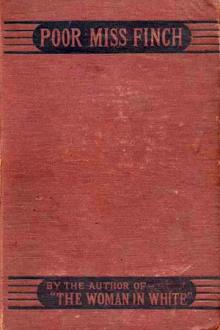Poor Miss Finch - Wilkie Collins (best books to read for beginners txt) 📗

- Author: Wilkie Collins
- Performer: -
Book online «Poor Miss Finch - Wilkie Collins (best books to read for beginners txt) 📗». Author Wilkie Collins
“You must be very strange people, my dear,” I said, “to make a mystery of such a plain case as this.”
“Plain?” repeated Lucilla, in amazement.
“Certainly! The gold and silver plates, and the strange tools, and the living in retirement, and the sending the servants away at night—all point to the same conclusion. My guess is the right one. The man is an escaped criminal; and his form of crime is coining false money. He has been discovered at Exeter—he has escaped the officers of justice—and he is now going to begin again here. You can do as you please. If I happen to want change, I won’t get it in this neighborhood.”
Lucilla laid herself back in her chair again. I could see that she gave me up, in the matter of Mr. Dubourg, as a person willfully and incorrigibly wrong.
“A coiner of false money, recommended as an honorable man by one of the first merchants in London!” she exclaimed. “We do some very eccentric things in England, occasionally—but there is a limit to our national madness, Madame Pratolungo, and you have reached it. Shall we have some music?”
She spoke a little sharply. Mr. Dubourg was the hero of her romance. She resented—seriously resented—any attempt on my part to lower him in her estimation.
I persisted in my unfavorable opinion of him, nevertheless. The question between us (as I might have told her) was a question of believing, or not believing, in the merchant of London. To her mind, it was a sufficient guarantee of his integrity that he was a rich man. To my mind (speaking as a good Socialist), that very circumstance told dead against him. A capitalist is a robber of one sort, and a coiner is a robber of another sort. Whether the capitalist recommends the coiner, or the coiner the capitalist, is all one to me. In either case (to quote the language of an excellent English play) the honest people are the soft easy cushions on which these knaves repose and fatten. It was on the tip of my tongue to put this large and liberal view of the subject to Lucilla. But (alas!) it was easy to see that the poor child was infected by the narrow prejudices of the class amid which she lived. How could I find it in my heart to run the risk of a disagreement between us on the first day? No—it was not to be done. I gave the nice pretty blind girl a kiss. And we went to the piano together. And I put off making a good Socialist of Lucilla till a more convenient opportunity.
We might as well have left the piano unopened. The music was a failure.
I played my best. From Mozart to Beethoven. From Beethoven to Schubert. From Schubert to Chopin. She listened with all the will in the world to be pleased. She thanked me again and again. She tried, at my invitation, to play herself; choosing the familiar compositions which she knew by ear. No! The abominable Dubourg, having got the uppermost place in her mind, kept it. She tried, and tried, and tried—and could do nothing. His voice was still in her ears—the only music which could possess itself of her attention that night. I took her place, and began to play again. She suddenly snatched my hands off the keys. “Is Zillah here?” she whispered. I told her Zillah had left the room. She laid her charming head on my shoulder, and sighed hysterically. “I can’t help thinking of him,” she burst out. “I am miserable for the first time in my life—no! I am happy for the first time in my life. Oh, what must you think of me! I don’t know what I am talking about. Why did you encourage him to speak to us? I might never have heard his voice but for you.” She lifted her head again with a little shiver, and composed herself. One of her hands wandered here and there over the keys of the piano, playing softly. “His charming voice!” she whispered dreamily while she played. “Oh, his charming voice!” She paused again. Her hand dropped from the piano, and took mine. “Is this love?” she said, half to herself, half to me.
My duty as a respectable woman lay clearly before me—my duty was to tell her a lie.
“It is nothing, my dear, but too much excitement and too much fatigue,” I said. “Tomorrow you shall be my young lady again. Tonight you must be only my child. Come, and let me put you to bed.”
She yielded with a weary sigh. Ah, how lovely she looked in her pretty night-dress, on her knees at the bedside—the innocent, afflicted creature—saying her prayers!
I am, let me own, an equally headlong woman at loving and hating. When I had left her for the night, I could hardly have felt more tenderly interested in her if she had been really a child of my own. You have met with people of my sort—unless you are a very forbidding person indeed—who have talked to you in the most confidential manner of all their private affairs, on meeting you in a railway carriage, or sitting next to you at a table-d’ho^te. For myself, I believe I shall go on running up sudden friendships with strangers to my dying day. Infamous Dubourg! If I could have got into Browndown that night, I should have liked to have done to him what a Mexican maid of mine (at the Central American period of my career) did to her drunken husband—who was a kind of peddler, dealing in whips and sticks. She sewed him strongly up one night in the sheet, while he lay snoring off his liquor in bed; and then she took his whole stockin-trade out of the corner of the room, and broke it on him, to the last article on sale, until he was beaten to a jelly from head to foot.
Not having this resource open to me, I sat myself down in my bedroom, to consider—if the matter of Dubourg went any further—what it was my business to do next.
I have already mentioned that Lucilla and I had idled away the whole afternoon, woman-like, in talking of ourselves. You will best understand what course my reflections took, if I here relate the chief particulars which Lucilla communicated to me, concerning her own singular position in her father’s house.
LARGE families are—as my experience goes—of two sorts. We have the families whose members all admire each other. And we have the families whose members all detest each other. For myself, I prefer the second sort. Their quarrels are their own affair; and they have a merit which the first sort are never known to possess—the merit of being sometimes able to see the good qualities of persons who do not possess the advantage of being related to them by blood. The families whose members all admire each other, are families saturated with insufferable conceit. You happen to speak of Shakespeare, among these people, as a type of supreme intellectual capacity. A female member of the family will not fail to convey to you that you would have illustrated your meaning far more completely if you had referred her to “dear Papa.” You are out walking with a male member of the household; and you say of a woman who passes, “What a charming creature!” Your companion smiles at your simplicity, and wonders whether you have ever seen his sister when she is dressed for a ball. These are the families who cannot be separated without corresponding with each other every day. They read you extracts from their letters, and say, “Where is the writer by profession who can equal this?” They talk of their private affairs, in your presence—and appear to think that you ought to be interested too. They enjoy their own jokes across you at table—and wonder how it is that you are not amused. In domestic circles of this sort the sisters sit habitually on the brothers’ knees; and the husbands inquire into the wives’ ailments, in public, as unconcernedly as if they were closeted in their own room. When we arrive at a more advanced stage of civilization, the State will supply cages for these intolerable people; and notices will be posted at the corners of streets, “Beware of Number Twelve: a family in a state of mutual admiration is hung up there!”
I gathered from Lucilla that the Finches were of the second order of large families, as mentioned above. Hardly one of the members of this domestic group was on speaking terms with the other. And some of them had been separated for years, without once troubling Her Majesty’s Post Office to convey even the slightest expression of sentiment from one to the other.
The first wife of Reverend Finch was a Miss Batchford. The members of her family (limited at the time of the marriage to her brother and her sister) strongly disapproved of her choice of a husband. The rank of a Finch (I laugh at these contemptible distinctions!) was decided, in this case, to be not equal to the rank of a Batchford. Nevertheless, Miss married. Her brother and sister declined to be present at the ceremony. First quarrel.
Lucilla was born. Reverend Finch’s elder brother (on speaking terms with no other member of the family) interfered with a Christian proposal—namely—to shake hands across the baby’s cradle. Adopted by the magnanimous Batchfords. First reconciliation.
Time passed. Reverend Finch—then officiating in a poor curacy near a great manufacturing town—felt a want (the want of money); and took a liberty (the liberty of attempting to borrow of his brother-in-law). Mr. Batchford, being a rich man, regarded this overture, it is needless to say, in the light of an insult. Miss Batchford sided with her brother. Second quarrel.
Time passed, as before. Mrs. Finch the first died. Reverend Finch’s elder brother (still at daggers drawn with the other members of the family) made a second Christian proposal—namely—to shake hands across the wife’s grave. Adopted once more by the bereaved Batchfords. Second reconciliation.
Another lapse of time. Reverend Finch, left a widower with one daughter, became personally acquainted with an inhabitant of the great city near which he ministered, who was also a widower with one daughter. The status of the parent, in this case—social-political-religious—was Shoemaker-Radical-Baptist. Reverend Finch, still wanting money, swallowed it all; and married the daughter, with a dowry of three thousand pounds. This proceeding alienated from him for ever, not the Batchfords only, but the peacemaking elder brother as well. That excellent Christian ceased to be on speaking terms now with his brother the clergyman, as well as with all the rest of the family. The complete isolation of Reverend Finch followed. Regularly every year did the second Mrs. Finch afford opportunities of shaking hands, not only over one cradle, but sometimes over two. Vain and meritorious fertility! Nothing came of it, but a kind of compromise. Lucilla, quite overlooked among the rector’s rapidly-increasing second family, was allowed to visit her maternal uncle and aunt at stated periods in every year. Born, to all appearance with the full possession of her sight, the poor child had become incurably blind before she was a year old. In all other respects, she presented a striking resemblance to her mother. Bachelor uncle Batchford, and his old





Comments (0)